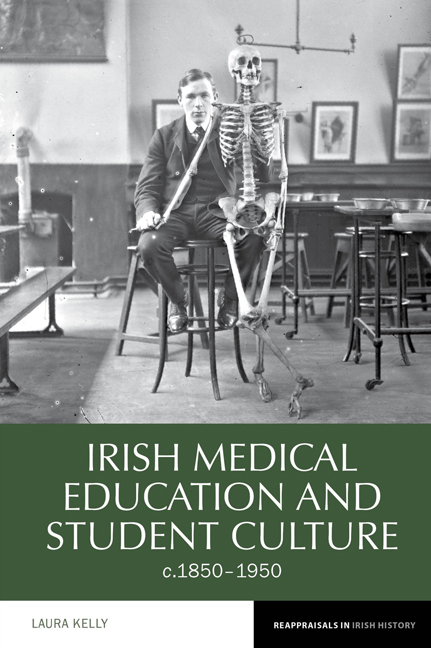Book contents
- Frontmatter
- Contents
- List of Figures
- List of Tables
- Acknowledgements
- List of Abbreviations
- Introduction
- 1 The Medical School Marketplace, c.1850–1900
- 2 ‘Entering upon an Honourable and Important Profession’: Irish Medical Student Image and Representation in the Age of Medical Reform, c.1850–1900
- 3 Beginnings: Medicine and Social Mobility, c.1850–1950
- 4 Educational Experiences and Medical Student Life, c.1880–1920
- 5 ‘Boys to Men’: Rites of Passage, Sport, Masculinity and Medical Student Culture, c.1880–1930
- 6 ‘This Feminine Invasion of Medicine’: Women in Irish Medical Schools, c.1880–1945
- 7 Medical Education and Student Culture North and South of the Border, c.1920–1950 200
- Conclusion
- Bibliography
- Index
1 - The Medical School Marketplace, c.1850–1900
- Frontmatter
- Contents
- List of Figures
- List of Tables
- Acknowledgements
- List of Abbreviations
- Introduction
- 1 The Medical School Marketplace, c.1850–1900
- 2 ‘Entering upon an Honourable and Important Profession’: Irish Medical Student Image and Representation in the Age of Medical Reform, c.1850–1900
- 3 Beginnings: Medicine and Social Mobility, c.1850–1950
- 4 Educational Experiences and Medical Student Life, c.1880–1920
- 5 ‘Boys to Men’: Rites of Passage, Sport, Masculinity and Medical Student Culture, c.1880–1930
- 6 ‘This Feminine Invasion of Medicine’: Women in Irish Medical Schools, c.1880–1945
- 7 Medical Education and Student Culture North and South of the Border, c.1920–1950 200
- Conclusion
- Bibliography
- Index
Summary
The early nineteenth century has been frequently hailed as the ‘golden age of Irish medicine’ as a result of the work of physicians Robert Graves and William Stokes, whose emphasis on bedside teaching earned fame for the Meath Hospital where they were based. However, by the 1850s, Irish medical education had fallen into ill repute. This condition was to prevail for most of the remainder of the nineteenth century. In an address to students in Cork in 1853, a young medical graduate, Thomas Holland, outlined the deficiencies of Irish medical education. In his view, the Irish School of Medicine was living on past glories, and although its system of clinical instruction as derived from German medical schools had been successfully introduced, Irish schools had been less successful in introducing aspects of the ‘highly scientific and truth-searching character of the German mind’. In Holland's view, the Irish School of Medicine had reached its ‘culminating point, and must of necessity decline, if we continue basking in the sunlight of our teachers’ names’. Moreover, he argued that ‘Irish medicine must assume a new character; a truly scientific spirit must be reinstilled into our school, if we desire that it shall keep pace with the advance of science’.
Irish medical schools from the mid- to late nineteenth century suffered from economic difficulties which resulted in the emergence of irregularities which were distinctive to Irish institutions, such as the sham certificate system, night lectures and ‘grinding’. Students also had a choice with regard to the type of qualification they aimed at, meaning that there was a different type of qualification to suit every pocket. Much attention has been given to the medical marketplace of the eighteenth and nineteenth centuries whereby practitioners competed for patients.3 In this chapter, I wish to apply the concept to Irish medical schools, suggesting that for the second half of the nineteenth century, owing to intense competition between the different institutions, medical students wielded a great amount of power as consumers. The chapter will also focus on several case studies of student protest and what these tell us about students’ concerns in the period. Moreover, students’ involvement in these disputes and their mobilisation over educational concerns, suggests that they were beginning to view themselves as active members of the Irish medical profession with an entitlement to contribute to professional issues.
- Type
- Chapter
- Information
- Irish Medical Education and Student Culture, c.1850–1950 , pp. 17 - 42Publisher: Liverpool University PressPrint publication year: 2017



